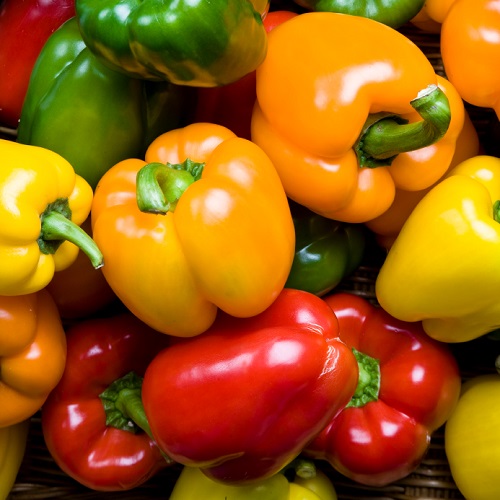Are Peppers A Fruit Or Veg? // Facts About Peppers // What's The Difference Between Red, Yellow and Green Peppers?

Although Bell Peppers get commonly mistaken as vegetables, they are actually fruits. Their scientific name is “Capsicum annum,” hence why you might hear people refer to them as capsicums, such as Australians, Indians and New Zealanders.
Bell Peppers come in many different colours, the main ones that we are exposed to in the United Kingdom are Green, Yellow and Red. However, the Yellow and Red varieties of Bell Peppers are just more ripe versions of the Green Bell Pepper, which of course also change the taste of the fruit. Most Bell Peppers are medium to large, fitting comfortably in your hand; and they all kind of have an upside-down Trapezoid shape.
Depending on the colour, the Bell Pepper will taste different. The less ripe (more green) the Pepper is, the more bitter it is. The more ripe (and more red) the pepper is, the sweeter it will taste; meaning the Yellow Bell Pepper sits comfortably in the middle; not too sweet and not too bitter. All of the Bell Peppers are quite plump, and when you bite into it, you might notice quite a distinct crunch, revealing a seedy inner core.
Bell Peppers were probably first cultivated 9 millennia ago, by South and Central American civilizations where the peppers first originated. The famous Christopher Columbus, an italian Explorer who first “discovered” the Americas thus opening the way to travel and colonization of the continents, was the one to discover Peppers for Europeans. Columbus and fellow spanish explorers named the fruit when they were looking for peppercorn plants to harvest black pepper from. Columbus took the fruit back to Europe, where they became relatively popular. Since then, they have been introduced to Africa and Asia.
Bell Peppers are rich in Vitamins A, Vitamin C and Potassium, not to mention their decent dose of Fibre, Folate and Iron. On top of that, they have quite low calories. The amount of Vitamin C goes down when the Bell Pepper is cooked, since Vitamin C breaks down in heat, but the amount of Antioxidants go up.
Vitamin A helps your immune system stay strong, to fight against illnesses and infections. It also helps keep your vision good in dim/low light. Furthermore, it helps keep your skin healthy!
Vitamin C helps protect your cells; keeping them strong and healthy. It also keeps your skin healthy (like Vitamin A), alongside keeping blood vessels, bones and cartilage healthy. Furthermore, they help with the healing of wounds.
Potassium helps maintain the balance of fluids in your body, also assisting in making the heart work properly.
Finally, Antioxidants (should you decide to cook the Bellpepper) help protect your body against a process known as oxidative stress. Oxidative Stress is something that can cause chronic diseases and premature ageing.
Fibre helps with the digestive system, allowing you to break down foods. Folates (a Vitamin B) helps the healthy growth of some of your organs, like the Brain and Heart. Iron helps produce red blood cells, which is important since they carry oxygen around your body.

 Free delivery to selected areas!
Free delivery to selected areas!

















Comments